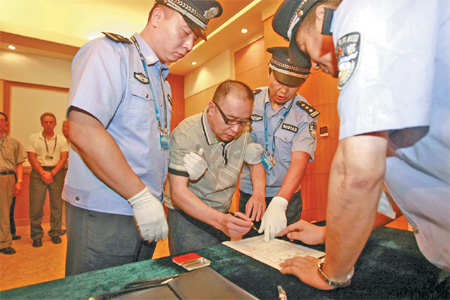Long arm of the law grabs its man
Return of most-wanted fugitive will act as a deterrent.
As Flight AC29 arrived in Beijing on Saturday afternoon, Lai Changxing went from being the most-wanted fugitive to illustrating the country's resolution to punish crime.
"China has made progress in tracing corrupt officials who fled to other countries in recent years," Zhou Hongjun, an international law professor at East China University of Political Science and Law, said.
"Lai's repatriation will be remembered as a turning point" in the continuing fight to bring the corrupt to trial, he said.
The transition at Beijing airport was routine: Canadian officers handed Lai over to Chinese police who announced his arrest.
The symbolism, however, was uncommon. Experts say the repatriation of Lai, whose legal odyssey in Canada began in 2000, is intended to deter criminals who think they can flee the country and remain free.
Lai was accused in 1999 of smuggling 53 billion yuan ($8.2 billion) worth of goods and of bribing officials while he was chairman of the Yuanhua Group in Xiamen, Fujian province.
The corruption scandal became one of the largest in modern Chinese history, with scores of high-level municipal and provincial officials sacked and imprisoned. In 2000, a Chinese court sentenced 14 people to death, 12 to life in prison and 58 to other prison terms for their involvement, Xinhua News Agency reported at the time.
China has worked to get Lai back since he was arrested in 2000 for immigration vio-lations in Canada, where he fled with his wife and three children via Hong Kong in August 1999. Canadian courts denied a 2006 request to deport Lai, with the judge saying he didn't believe China's pledge not to execute Lai. Canada does not have the death penalty.
The majority of corrupt officials who have skipped the country were engaged in construction engineering or finance sectors, said Chen Lianfu, director of the Anti-Corruption and Bribery Bureau under the Supreme People's Procuratorate.
"More than 90 percent of them were accused of corruption, bribery and embezzlement," he said, "and they transferred the illegal proceeds mainly through money laundering, illegal investment and underground financial institutions."
Those are among the eight money-transfer channels, used since the late 1980s, identified in a report last month by the China Anti-Money Laundering Monitoring and Analysis Center, which was set up by the People's Bank of China.
However, the exact amount of assets transferred remains a mystery.
The situation has persisted, although a government has intensified over the years.
From a criminal perspective, fleeing the country offers low risks and high rewards. Those on the other side of the law see it differently.
The ability of corrupt officials and business people to escape with impunity not only damages China's image internationally, but also undermines people's trust in the government, said Liu Qinglong, a sociology professor at Tsinghua University.
"Our country is still at the early stages" of tracking down such fugitives, he said. Some haven't been found yet; others are in countries without extradition treaties with China and "remain out of legal reach. The fight still has a long way to go."








